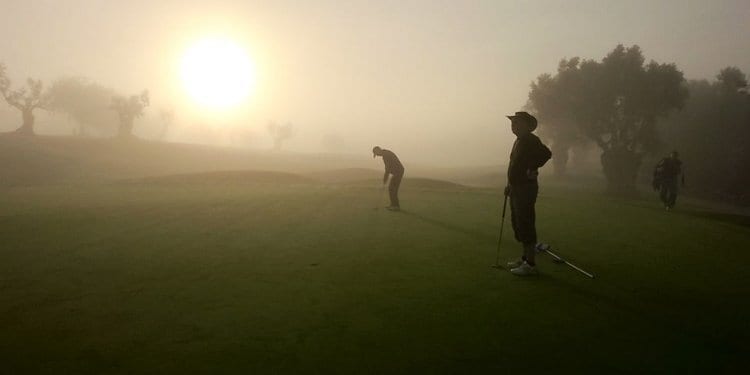Picture a chain of historic and charming small towns strung together by a single-lane highway, people walking along or bicycling, passing roadside stands offering fresh fruit… 3 euros for a 5-pound bag of oranges…
The weather is warm… and you see flowering vines growing over the stucco walls of many properties.
Continue east, and the small towns give way to flowering hedges, tall trees, and grasslands.
Thanks to their long reign, the other thing you notice throughout this Algarve region is a strong Moorish influence. The Moors introduced the fig, carob, almond, and orange trees that you find throughout southern Portugal… and many churches, including in Loulé, Faro, and Tavira, were originally mosques.
The Romans were in this part of Portugal, too. They are credited with the production of salt here and with planting the olive trees the area is known for. The bridge of Tavira dates to the Romans, and the introduction of Latin was the base for the Portuguese language.
Portugal was arguably the first Catholic country in Europe. However, many churches in the Algarve, with their intricate gilded wood designs in the Baroque style, came later, during the colonization of Brazil in the 18th century.
A major power in Europe at the time, Henry the Navigator sailed from the Algarve to discover the Portuguese islands east and south and to conquer the African coast and Morocco. Later, Vasco da Gama, among others, discovered the routes to India and Brazil, resulting in the largest trading empire in the world.
Towns like Tavira became important trading ports. Later, during almost 30 years of war with Spain, fortresses were built along the borders and the coastline to protect the cities, and many of these remain today.
In 1755, after an earthquake and the tsunami that followed, many Algarve cities were destroyed. Faro survived, and became capital of the Algarve.
In 1974, 50 years of dictatorship ended, and Portugal became democratic. The Algarve soon became known for its tile work, lace, cork, and agriculture.
More recently, the emphasis has been on tourism.
The primary tourist draws are the golf (the Algarve has more golf courses per capita than anywhere else in the world)… and the beaches.
In the western Algarve, the coast is known for its wild waves (making for world-class surfing) and jaw-dropping cliffside views.
In the eastern Algarve, the coast is no less beautiful… but gentler.
With the increase in tourism the country is enjoying, the Algarve’s more popular areas are getting too crowded and expensive for some… and the eastern Algarve is starting to come into its own. European expats have been the first to notice the opportunity this less recognized stretch of the Algarve coast presents and have begun buying properties in Olhão and Tavira.
And, while some Brits may be moving back to their home country in anticipation of Brexit, it seems many more are trying to hurry and establish themselves in the Algarve so they can stay legally and indefinitely once the U.K. leaves the EU.
An increasing American influx is being felt, as well. While Lisbon has been home to an established group of American expats for some time, more Americans are finding their way to the Algarve. They are drawn by the affordable coastal lifestyle on offer… and the safety. This is a great place to raise children, and more and more American families are making the move here.
The eastern Algarve is a natural wonderland. Living here you’d fill your days doing things like bird-watching, hiking, kayaking, swimming, boating, golfing, sailing, diving, horseback riding…
The eastern Algarve is all about the great outdoors.
Music is ever-present. Outdoor festivals and concerts are staged every weekend during summer.
As Portugal’s popularity has expanded considerably in the last two years, prices have increased, but not noticeably, especially if you live a local rather than an imported lifestyle.
A couple could live in Portugal’s eastern Algarve on a penny-pincher’s budget of as little as 900 euros per month, including rent (of, say, 350 euros).
A more reasonable and typical budget would be 1,500 to 1,600 euros per month… still a tremendous bargain for Western Europe.
If you’re ready to slow down and savor moments in the sun… discover a healthier lifestyle and food… find a safe place with an emphasis on family and friends… live a first-world life at third-world prices… without a language barrier to start… I’d say you should get yourself to Portugal’s eastern Algarve to have a look for yourself.
For my money, it’s the best lifestyle on offer anywhere in the world.
Melanie Veah











